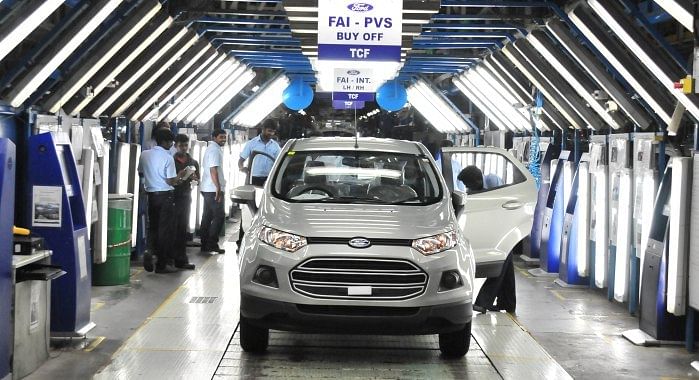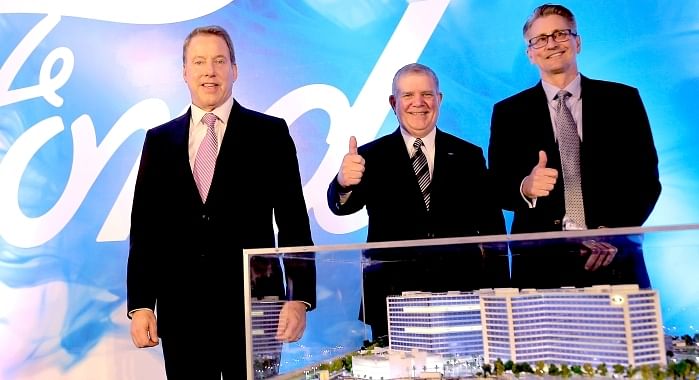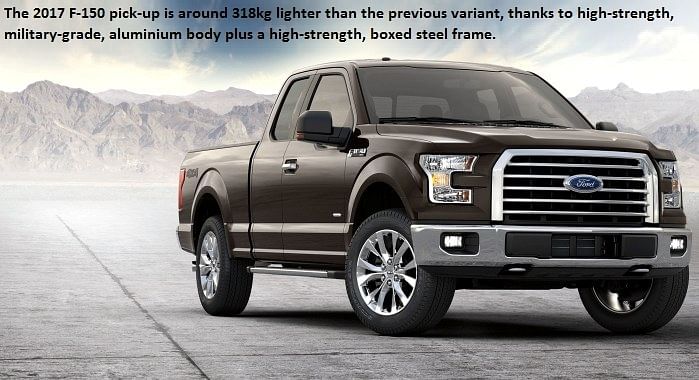'Expect many partnerships between OEMs and tech firms, start-ups and universities. No one company has all the answers.'
Bill Ford Jr., Ford’s executive chairman, speaks on the future of cars, the game-changing role Ford will play in the business of mobility, the plans he has for India, and family values.
William Clay ‘Bill’ Ford Jr., Ford Motor Co’s executive chairman, who was in India last month to announce plans to set up a state-of-the-art Global Technology and Business Centre in Chennai, speaks to Shapur Kotwal on the future of cars, the game-changing role Ford will play in the business of mobility, the plans he has for India, and family values.
In the future, India will become an intellectual and production hub for Ford. Your journey and love affair with cars started at a very young age. Tell us about it.
In a way, I was born into this with my great-grandfathers Harvey Firestone and Henry Ford. I fell in love with cars, especially fast ones, from an early age and used to test-drive the cars my dad got home while he sat down to dinner. Over the years I’ve owned many of the Mustangs, the Shelbys, and the GTs.
Does the concept of driverless cars appeal to you?
For where I live, yes. Do I like sitting in city congestion? No. But I love driving every day and, right now, I’m driving a Focus RS. I think it is one of the best cars we’ve ever made.
Do you see the two worlds (driverless cars and sporty ones) converging in the future?
Yes. For one, there will be a lot of safety features coming on base models in the future. And with autonomy, people’s requirement will be different depending on where they live. Outside city limits, your experience will not be that different from what it is today. But within the city, autonomous driving and car sharing will be part of life.
Where is the future heading for Ford? Do you see as much of a game-changing role as it was when the company was founded?
Yes, I do. But it will happen over time, in cities before it happens anywhere else because the need is the most there. The way we are getting into it, if we come out right at the end of 5-10 years, we’ll be able to provide people with not just mobility, but a new definition of the word. We’ll also be able to touch people more often than by just selling a car every four-five years.
Future business will be less capital intensive; new-age services will be just as important as the product.

Does Ford need to be more agile when it comes to future tech?
I’m not sure one size fits all in this and what may work for one player may not for another. We have a really good autonomous team working hard under Raj Nair, our product development head. What you’ll see are many partnerships going forward. Not necessarily between OEMs, which could also happen, but between OEMs and tech companies, start-ups and universities. This is because the world is changing so quickly and no one company has all the answers. In fact, most companies don’t even know what the questions are yet. It is going to be a fun journey.
The F-150 pickup truck is one of your best-selling and, most profitable, products globally. How do you relate to it at one end of the scale and green cars and mobility at the other? What is the future from here?
We are full-line manufacturers and make everything from big trucks to small cars. One of the things we decided of 2007-08 was to completely change the company and what it stood for. We decided to remain a full-line manufacturer, yet make each product as environment-friendly as we could. What did this mean for the F-150?
We put in the EcoBoost V6 engines when people traditionally only had eight cylinders. We made all-aluminium bodies and reduced almost 700lb (318kg) of weight from the vehicle. It was a decision to make the toughest truck but the most environmentally responsible one. And we took that philosophy all through our line. So, if we decided to make only B cars and electrify them, we could do that. But we have customers who have a variety of needs, including buying our F-150. There’s space for both.

L-R: Bill Ford, executive chairman, Ford Motor Co; David L Schoch, president, Ford Asia Pacific; and David Dubensky, executive director, Global Business Services. On November 8, Bill Ford announced plans to invest Rs 1,300 crore to set up the Global Technology and Business Centre in Chennai. The facility will serve as a hub for product development, mobility solutions and business services for India as well as other markets.
Our basic job is to provide different solutions to customers based on their needs, and those needs will change. A part of our job as a manufacturer is to anticipate those needs and help change them.
What are the challenges facing mass-market plug-in hybrid and electric cars?
Hybrids are a form of electric, but I get your question about the types of EVs. Affordability, range, and ease of charging will determine the pace of adoption (and the ideal solution). Customers will have to feel comfortable about the fact that they can plug-in and charge their cars along the way. The range needs to be large enough for them to be confident. We need to work in those areas.
The general infrastructure is important too, but that is something a country (wherever you are in the world) needs to work on. We also have to get the economics right before these solutions are launched. In addition, India has to figure out how it will face the huge electric supply requirement and if power will be generated in a green manner in the first place. Running an electric car powered by a coal-fired power plant is not a great solution.
What is your take on Tesla?
I love what it has brought to this industry. Tesla came in as a technology player and is figuring out that the current car and SUV piece of the business is hard.
We come from a car and SUV background and are adopting new technologies. But we’re all going to end up roughly in the same place. It’s a question of who does it most thoughtfully for the customer.
There was an electric version of the Model T, the car that started it all for Ford. Do you still have it?
We don’t. Maybe it’s in the Henry Ford Museum, I’m not sure. One thing’s for sure, the early vehicles were steam, electric, and then they found oil in Texas and the cost of gasoline came down so low that it became the most cost-effective form of transportation.
Sometimes I wonder if that hadn’t happened, the whole industry would have developed as electric because, remember, Henry Ford worked for Thomas Edison at Edison Lighting and they were lifelong friends. In fact, the whole Henry Ford Museum was dedicated to Thomas Edison. I have often wondered about this, particularly given how close Henry Ford and Thomas Edison were.

Henry Ford was quite into the ‘outdoors’ and was someone who often spoke of nature and spending time in the wild. Is your focus on the environment, congestion, and new mobility something that was passed down to you?
No, it’s not a family thing. I came by it completely on my own. But as I got older, I understood that his interests and mine are so similar. I wasn’t aware of that earlier. I probably didn’t pay as much attention to my heritage as I should have. It’s funny because even my children point it out to me. They do read a lot of the biographies.
Local engineering is essential for Ford to have more India-focused cars. Should you have taken the step sooner to set up a development centre here?
My expectation is that we get our product development centre here up and running and then do as you are suggesting (have more India-focused cars). It should allow us to have better solutions for India, but frankly, the product development centre here will also work as part of the global team and not just for India-focused cars.
Looking 10-15 years ahead, where do you see Ford in India? What will you do differently?
We’re making cars, SUVs, and engines in India today. In the future, the key differences will be that India will become an intellectual and production hub for Ford. And that is expected to grow given the education infrastructure here and the emphasis on it. In the cities, you’re likely to see many solutions (ownership, lease or part rental) that will look very different from today.
RELATED ARTICLES
INTERVIEW: "EV Demand is Rebounding both in India and Around the Globe" - JLR's Rajan Amba
Jaguar Land Rover India MD Rajan Amba discusses the India–UK FTA, the company’s manufacturing plans, the upcoming Panapa...
TVS Celebrates 20 Years of Apache, Eyes Premium and Global Push
Marking two decades of its flagship performance brand, TVS Motor unveiled special anniversary editions on Saturday while...
Q&A: Mahindra's Nalinikanth Gollagunta on Upcoming Festive Season, 'Bold' Design Choices
Automotive Division CEO Nalinikanth Gollagunta says mid-teens growth is achievable with Roxx ramp-up, BEVs, and a resil...






 20 Dec 2016
20 Dec 2016
 14770 Views
14770 Views





 Prerna Lidhoo
Prerna Lidhoo


 Darshan Nakhwa
Darshan Nakhwa


